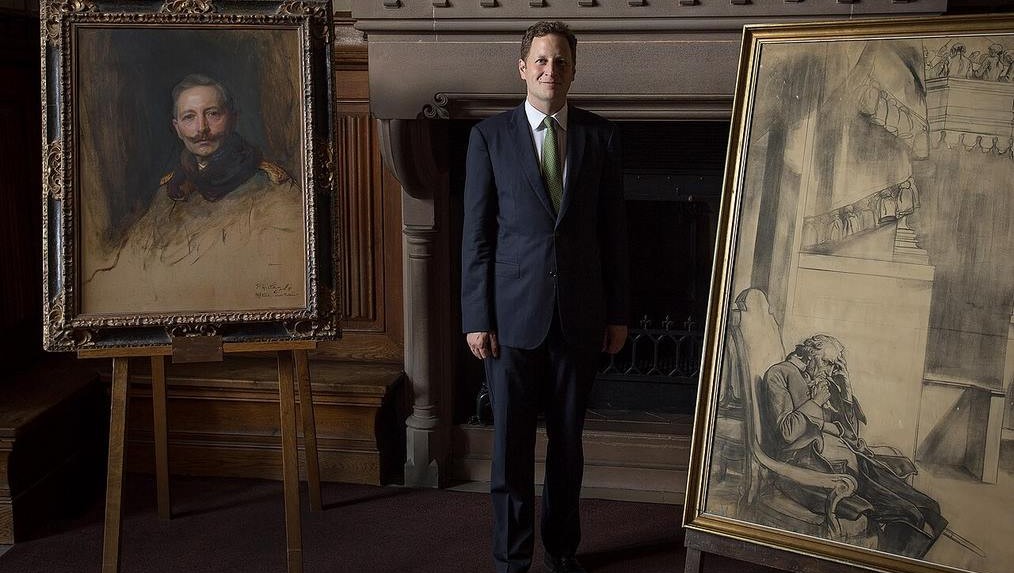 Georg Friedrich, Prince of Prussia – credit © Oliver Mark CC 4.0. BY-SA
Georg Friedrich, Prince of Prussia – credit © Oliver Mark CC 4.0. BY-SAThe destiny of a large collection of property and art belonging to the family of the last German emperor has finally been decided after 100 years of uncertainty that persisted throughout some of the largest events in 20th-century Europe.
The story centers around the Hohenzollerns, the royal family of Prussia that included Kaiser Wilhelm II who ruled the newly-united Germany during the First World War.
The long-ruling family, whose ancestry can be traced by to the 11th century, had many royal properties such as castles and palaces, as well as collections of furnishings, artworks, and archival materials, seized at various points throughout the decades.
The great-great grandson of Wilhelm II, Prince Georg Friedrich Ferdinand of Prussia, began a legal campaign in 2014 to reclaim some of this stolen property. Cases were brought and lost, appealed, and debated, all while hoovering up money on both sides of the court aisle.
Then, in 2023, Prince Georg abandoned all the lawsuits, and a decision was made with states of Berlin and Brandenburg to settle the matter out of court. Now in May, the House of Hohenzollern and the Culture Ministry have announced the establishment of a new nonprofit foundation that will manage the cultural heritage of the family for the benefit of the German people.
3,000 works of art and 19th-century artifacts formerly owned by the family will be held in the collections of museums run by the Prussian Palaces and Gardens Foundation and the Prussian Cultural Heritage Foundation, as well as the German Historical Museum, to be managed by a 9-member board that includes 3 representatives of the family called the Hohenzollern Art Property Foundation.
Culture Minister Wolfram Weimer called the agreement “an enormous success for Germany’s heritage and for art audiences.”
“For 100 years, there was perpetual uncertainty about objects that are central to the history of art and collecting by Prussia—and therefore, to German history. With this agreement we have ended a conflict that has cost both sides time, money and energy over many years.”
An uncertain history, a hopeful future
In 2023 when Prince Georg announced he was abandoning litigation, he hoped that dropping the claim would “open the way for an unencumbered historical debate on the role of my family in the 20th century following the end of the monarchy.”
The “role” he refers to was the sticking point underpinning the whole 100-year dispute.
The story begins with the Treaty of Versailles which saw WWI end in the unconditional surrender of Germany. The Kaiser was to abdicate, and the monarchy to be abolished. He exiled himself to neutral Netherlands, while some 70 estates, palaces, and castles, some of which date back as far as the 13th century, gradually were transferred to ownership of the German states.
As the Weimar Republik crumbled under the weight of hyperinflation and civil unrest, the National Socialists rose to power, and with them rose the idea in the former Kaiser that Hitler may consider restoring the monarchy.
ARTS IN GERMANY: Exquisitely Preserved 1,000-yo Gaming Pieces Found in German Castle Offer Snapshot of Medieval Pastimes
Fast forward to the end of the Third Reich, and the lands and territory formerly belonging to the Hohenzollerns fell under the control of the Soviets, and disappeared behind the Iron Curtain. Fast forward again to the end of the Soviet Union and the reunification of Germany, and Wilhelm II’s descendants immediately began petitioning to have the property confiscated by the Soviets returned to them.
This is when a key part of the dispute arose. Post-WWII German law stated that any person, family, or organization who aided and abetted the Nazis and sought restitution claims against former East Germany would have the claims dismissed as a penalty for that support.
Since approximately 1994, the German state governments and the Hohenzollerns have been in debate, aided by academics, about just how far Wilhelm II’s support for Hitler went, whether it was genuine or feigned, and whether it was substantive or not.
MORE ROYAL SCUTTLEBUG: Crowns and Scepters Discovered Hidden Inside the Walls Beneath a Lithuanian Cathedral
Reports from DW suggest that the debate was more or less divided between four prominent German historians, with two arguing that it may or may not have been genuine, but even if it had been, it wasn’t substantial, and two arguing that it did have a measurable impact on Hitler’s ambitions, and was significantly genuine.
Prince Georg in the case of the dispute has argued that it is nonsensical to deny the property claims of all Hohenzollerns based on the actions of one member, exiled in another country, and largely powerless to influence events back home: that in other words, the sins of the father should not be borne by the son.
“Anyone who panders to right-wing extremism cannot be a tradition-setter for our house,” Prince George said of his ancestor.
SHARE This Long-Running Art Dispute And Fascinating History With Your Friends…
Source link

